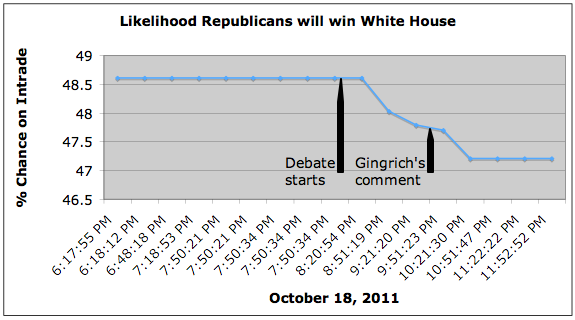 The Ticket
The TicketDid ‘maximum bickering’ in Nevada debate hurt the Republicans’ chances in November?
Newt Gingrich delivered one of the most memorable lines at the end of the Republican presidential debate on October 18 in Las Vegas, accusing moderator Anderson Cooper of goading the candidates into "maximizing bickering" and warning that squabbling among Republicans "is probably not the road to the White House."
In the debate, every time one candidate referred to another, Cooper gave the mentioned candidate 30 seconds to respond. In another universe, this rule may have led the candidates to stick to the issues; after all, attacking an opponent from the podium only meant giving their target more airtime.
In reality, however, the jabs came in as fast and furious as ever. Cooper enforced the rebuttal rule even if more than one candidate was named--and even if mentions occurred inside another candidate's rebuttal (opening up the possibility an endless recursion of rebuttals, but never mind). So the rule's practical effect was to ping the debate back and forth between candidates arguing with each other by name, which ultimately provoked to the astute observation from an exasperated Gingrich. The debate format, executed brilliantly by Cooper, also served CNN well, naturally giving more time to the biggest targets—the frontrunners Mitt Romney, Rick Perry, and Herman Cain—without appearing unfair.
So if the Republican candidates came across at times as unpresidential, did they unwittingly help Barack Obama, as Gingrich feared? A quick way of testing Gingrich's claim is to consult the real-time behavior of prediction markets such as Intrade and Betfair during the pertinent parts of the Oct. 18 debate. Think of a prediction market as a stock exchange where people trade candidates instead of companies. Currently, for example, on Intrade you can invest $48 in Obama to win reelection. If he does win, your $48 will turn into $100; if he loses, so will you (with the clear proviso that the Obama campaign will have a lot more money at stake). Betfair works in an analogous way, though using words (such as"back" and "lay") familiar to British punters, er, gamblers. Because most polls update only every few days, and small changes can fall within the margin of error, they aren't as ideally suited for measuring the effect of one debate as the prediction markets are.
So when we look at the numbers on Intrade, we see that Gingrich may have been on to something. The debate began at 8pm EST on Tuesday October 18. At that time, InTrade wagerers had assessed the Republicans' chances of defeating Obama in 2012 at 48.6 percent. As the debate was ending around 9:52 pm, their chances had fallen by almost 1 percent. That's when Gingrich made his comment about GOP bickering. By 10:30pm that night, the Republicans' chances had dropped further, to 47.2 percent, down 1.4 percent in total. Although the Republicans' odds on Betfair did not see a similar decline that day, traders on Intrade did seem to agree with Gingrich, at least to a small degree, that the Republican candidates' display in the Nevada debate may have hurt the party.
David Pennock has a Ph.D. in computer science from the University of Michigan and currently heads the algorithmic economics group at Yahoo! Research. Follow him on twitter @pennockd.
Other popular Yahoo! News stories:
Steve Jobs predicted Obama would be a one-term president
Steve Forbes: Perry's flat tax 'most exciting tax plan since Reagan's'
Michele Bachmann's New Hampshire staffers resign en masse
Want more of our best political stories? Visit The Ticket or connect with us on Facebook and follow us on Twitter.


